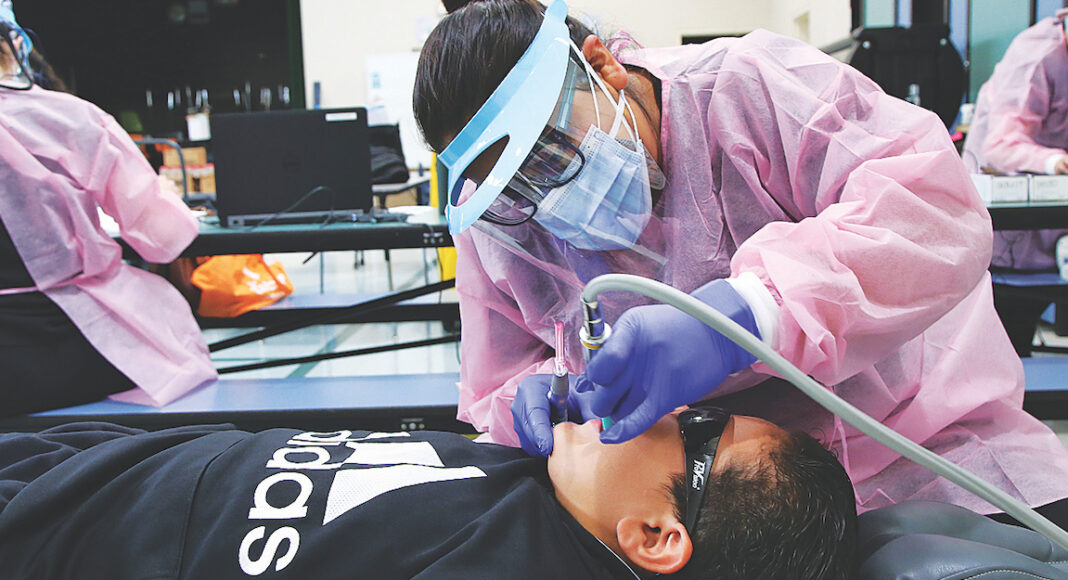When Laura Marcus, the CEO of Dientes, pitched the idea to invest $50 into the college savings accounts of every child who visits the dentist, she knew it would be a hard sell for board members.
“This is very outside of our wheelhouse,” Marcus says. “We have very little to do with education, so why would we invest this kind of money?”
But the more she learned about Semillitas, the program that aims to open up a college savings account for every newborn in Santa Cruz County, the more Marcus realized this partnership could be mutually beneficial.
“I think it links in so clearly to our goals of making prevention more common than treatment,” Marcus says.
As part of their recently announced alliance, Dientes—a nonprofit that helps make dental services accessible to low-income patients—will deposit money into children’s Semillitas savings account on a quarterly basis for oral milestones, like a child’s first tooth, or birthday dental visits. It will also give money for annual visits (for children ages 2 to 5), and sealant visits (for children age 6). In total, Dientes will deposit up to $200 to a child’s Semillitas account.
“Semillitas is giving parents in Santa Cruz County the opportunity to begin investing in their children’s health, education, and future from the day they are born, and we are thrilled to be a partner in this innovative program and provide incentives for preventative dental care along the way,” Marcus says.
Semillitas (or “little seeds” in English) aims to provide every child in Santa Cruz County born after December 2020 with $500 in a college savings account by the time they enter kindergarten. The money collected in these savings accounts can be used for costs related to four-year colleges, but students can also use the funds collected for trade schools and junior colleges.
Around the country, cities and states are offering similar college savings programs to their residents. But Santa Cruz County is implementing a rarer model that will automatically open up a savings account for every child at birth, regardless of the family’s economic background. It’s only the second college savings program in California that starts at birth—the other being in Oakland—and the only one that will provide an account for every newborn.
The county’s program is modeled after SEED for Oklahoma Kids (SEED OK) in Oklahoma, where college savings accounts are opened for every newborn. The results of SEED OK are being studied and updated every year, but already reports are finding a shift in behavioral attitudes.
The fact that children have a college savings account is more important than the amount in it. Studies show that children who have anywhere between $1 and $500 in a college savings account are between three and four times more likely to pursue higher education. And just having these accounts improves children’s social-emotional development and mental health.
These positive impacts extend to the family: in-depth interviews and survey data report that just having these accounts encourages mothers to have higher educational expectations, more positive parenting practices and fewer depressive symptoms.
It’s children and families from disadvantaged backgrounds that are documented to have the greatest positive impacts from these types of accounts. So in a county where nearly 50% of children are born into families that have Medi-Cal or are considered low income, this has the potential to significantly change the trajectory of local families, says Maria Cadenas, executive director at Santa Cruz Community Ventures, which first pushed the county to consider implementing this type of program in 2019.
“This type of program helps ensure that our communities have a sense of belonging regardless of their household income, that our children have a sense of a future, regardless of where their parents may be,” says Cadenas.
In lower-income households, money will go to the most pressing and essential needs first, says Cadenas. But as the labor market grows more competitive, it’s essential that lower-income children have access to higher education opportunities if the county wants to address the racial wealth gap that persists across generations, she says.
Post-secondary education is becoming increasingly essential, especially for higher-paying jobs. If current trends continue, nearly half of all jobs in California will require a bachelor’s degree by 2030.
Meanwhile, industries typically accessible to individuals with lower education are shrinking. Even before the pandemic, lower-earning industries in Santa Cruz County such as agriculture and farming industries were either stagnant or declining. At the same time, mid-earning industries that typically require higher education, like healthcare and education and the technology sector, were expanding.
For a county with a large agricultural worker population, Cadenas hopes a Semillitas account will open more opportunities for children who see a different future for themselves. It’s a small step toward breaking into a different wealth bracket.
Cadenas, a first-generation college student herself, knows first-hand the impact of even discussing college as a viable opportunity.
“For me, personally, the first time I thought about college was when somebody asked me about it in middle school. It wasn’t even in my realm of possibility,” Cadenas says. “And what we’re doing right now is making sure that it’s a realm of possibility for every child, and for every parent to know that it’s a realm of possibility for their child.”
Cadenas has witnessed the impact of the savings accounts already, even theoretically.
In initial discussions about the program’s format, Cadenas met with local families from varying backgrounds and socioeconomic statuses. Cadenas shared an encounter that left a lasting impression on her, about a young mother who had brought her baby to the meeting.
“A mom was holding her daughter, and she looked down at her daughter, and she said, ‘You don’t have to be like me, you’re going to college,’” Cadenas says, her voice cracking with emotion.
It’s these types of stories that the Semillitas board members kept repeating, stories of families feeling hope for their children’s future. And it’s a hope that Semillitas is founded on: that simply having a college savings account signals to children that someone believes in their potential, and this will plant a small seed of hope for their future.
“We say from birth, you’re not alone in this, and we’ll walk with you in this and we’re committed to you and your success,” Cadenas says. “It opens the possibility of choice.”
Every child born after December 2020 is qualified for collecting money via their Semillitas college savings account. Find out more at www.semillitas.org.


















